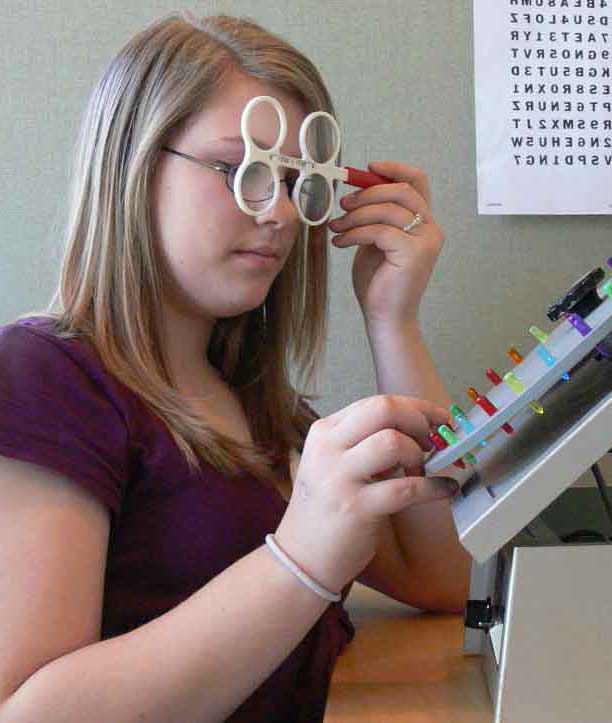Optometric Vision Therapy is devoted to aiding development while improving and enhancing visual performance.
Vision Therapy (also known as VT) can benefit people of all ages. Performed under the Doctor's supervision, Vision Therapy is a progressive program of vision procedures individualized and updated to fit the needs of each patient.

Unlike other forms of exercise, the goals of Optometric Vision Therapy does not include strengthening the eye muscles, because your eye muscles are already very strong. Although Vision Therapy activities do cross over into the areas of Occupational Therapy and Educational Therapy, what separates vision therapy from other therapies is the exclusive use of lenses, prisms, flippers (a kind of double-lens tool) and anaglyphic (3-D) filters. Other tools used in Vision Therapy include occluders (patches), electronic targets with timing mechanisms, balance boards, customized VT computer programs (including reading, visual memory, perceptual skills and much more), board and specialized card games, building activities and a wide variety of books.
Powerful changes are created in visual perception and spatial awareness with the tools used exclusively in Vision Therapy.
Over several decades, Behavioral Optometrists have developed and used Vision Therapy in combination with the appropriate tools for the purposes of:
- Preventing vision and eye problems from developing
- Developing visual skills to perform more effectively in school, work and play
- Enhancing abilities on tasks requiring sustained visual effort
- Remediation or compensation for existing vision and eye problems
There are five key areas of function that Vision Therapy addresses:
- Visual Motor Guidance (gross motor and fine motor)
- Eye Tracking (ocular motility)
- Eye Focusing (near and far accommodation)
- Eye Alignment (binocular convergence and divergence)
- Visual Information Processing (includes visual memory and visualization)
Our programs differ from many others in its emphasis. These last five functions are often taught as five separate skills. Our therapy is organized in a different fashion. It starts with a revolutionary statement:
"Binocular Vision Dysfunction can lead to adaptations. It is essential to identify which patients have developed adaptations to binocular vision dysfunction that affect academic performance."
Visual Performance: Some adaptations affect the speed, endurance, accuracy, consistency, and agility with which the patient can input visual information from the two eyes. Problems in these areas may result in low scores in the Working Memory and Processing Speed sections of common intelligence tests, but these problems occur at the visual data input level, not the brain processing speed level.
Visual Attention: Other adaptations to binocular dysfunction affect visual attention to either visual detail or visual location. These problems often mimic developmental issues such as ADD, learning disability, or high functioning autism.
Visual Intelligence: The ability to learn from what is seen. Problems in these areas often depress the child’s scores in the Working Memory and Processing Speed sections of common intelligence tests.
These adaptations can then result in reduced ability of the child to act upon the information received from the two eyes. This can often mimic such conditions as dysgraphia and dyslexia.
We succeed!
We feel that in order to achieve the elusive goal of consistent results, we must first identify the patients who have developed adaptations to binocular vision dysfunction that affect academic performance. Then at the proper time, we address the problems that exist in the areas of visual performance, visual attention, and visual intelligence.
It’s not something that we could teach an assistant to do with 30 or even 300 hours of instruction. It was a long process that took us over 27 years, and 30,000 hours to learn. It is the core of what we do and the reason that we are advocates of the concept of "Doctor Provided Vision Therapy."
Helping your child is a responsibility that we take very seriously! It is the reason why both Dr. Colin Kageyama and his son Dr. Kelly Kageyama spend over 70 hours each week personally doing and directing vision therapy.
